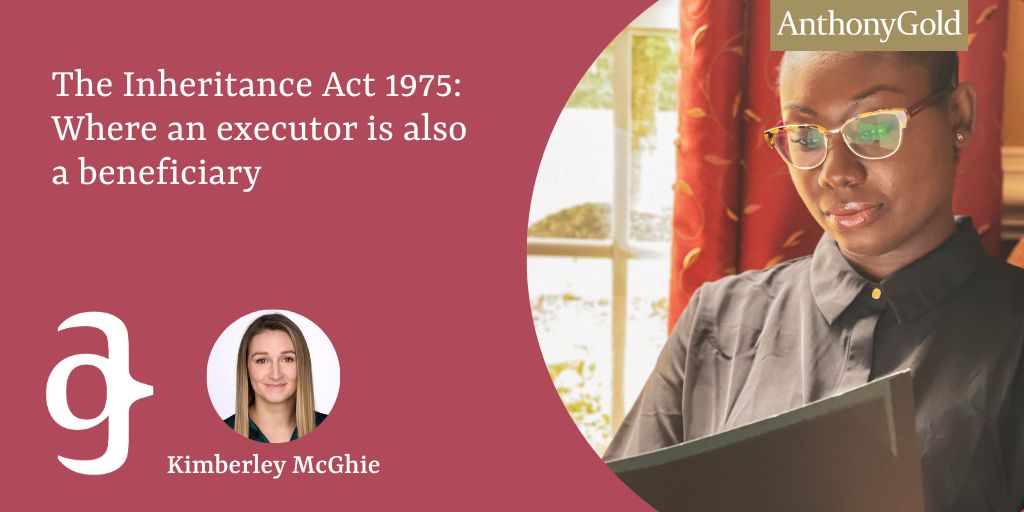The Inheritance Act 1975: where an executor is also a beneficiary


The Inheritance (Provision for Family and Dependants) Act 1975 (“the 1975 Act”) allows certain people to bring a claim against an estate. If they are successful in bringing that claim, it would give them a larger share of the inheritance. In my previous blog, I explained the role of the executor in a 1975 Act claim. This blog will consider where the executor is also a beneficiary.
It is common for an executor to also be a beneficiary of the same estate. In those circumstances, the executor must comply with the Civil Procedure Rules (“CPR”) 57.16(5) in their capacity as executor, but they are also entitled to actively defend the claim in their capacity as beneficiary.
In their role as beneficiary, they will not automatically be entitled to their costs from the estate. The general rule in 1975 Act proceedings is that all costs come from the estate, as long as all sides have acted reasonably. That said, there is a large degree of discretion, and what the judge thinks is reasonable may differ from that of a beneficiary. There is particular risk if a beneficiary does not look to explore dispute resolution options such as mediation or if reasonable offers are not dealt with properly. If beneficiaries are belligerent, they may end up not recovering their own costs and paying most of the successful party’s costs, subject to detailed assessment.
One solicitor can usually act for the executor and beneficiary. This is a good way of keeping costs down. However, where there are multiple executors and beneficiaries, solicitors should be careful to ensure there are no conflicts of interest. A conflict may arise where one beneficiary wishes to defend the claim but another does not, or where one beneficiary wishes to bring a competing claim. If a conflict is identified at the outset, the solicitor may not be able to act in the matter at all.
If one solicitor acts for both the executor and beneficiary it is good practice to distinguish between the costs incurred by them in their different capacities, as the executor’s impartial costs may be reimbursed from the estate on a different basis. To avoid any argument that the executor has sought to reimburse themselves for costs incurred in defending the claim, they should prepare two separate witness statements: one in respect of their role as executor (the costs of which should be invoiced to them separately in their capacity as executor); and the other in their capacity as beneficiary, the costs of which should be invoiced to them personally. Whilst the solicitor’s time could be recorded on one file, it is easier to differentiate if two separate files are open, one for the executor and one for the beneficiary, so that time can be recorded separately.
If you are an executor or beneficiary, and a 1975 Act claim has been threatened against the deceased’s estate, you should seek legal advice. This should be recoverable from the estate. Our specialist Contentious Probate Team at Anthony Gold would be pleased to assist you. You can contact us by email at mail@anthonygold.co.uk or please call us on 020 7940 4060.
On 19 June 2024, Anthony Gold partner Tom Dickinson and Senior Associate Solicitor Kimberley McGhie will be hosting a seminar with Ten Old Square Chambers to talk through the process of a 1975 Act claim. To register, please click on the banner below:
Please note
The information on the Anthony Gold website is for general information only and reflects the position at the date of publication. It does not constitute legal advice and should not be treated as such. It is provided without any representations or warranties, expressed or implied.

Our Latest Wills, Trusts & Estates Insights
- September 22, 2025
How are the mighty fallen? A hard lesson learnt
- September 18, 2025
What’s on the Horizon: Post Office scandal & deadlines
- September 12, 2025
How to claim an unclaimed estate in the UK: Probate and bona vacantia explained
- August 14, 2025
Ozzy Osbourne’s Will: Lessons in Protecting Your Legacy
- August 14, 2025
A Dog is for Life – but what happens afterwards?
- July 22, 2025
Bona Vacantia and fraudulent wills – how to protect your estate
Related Guides
- June 30, 2025
A Guide to Writing a Will in the Digital Age: Law Commission Reforms Explained
- March 11, 2025
Leaving Money to Charity in your Will: A Guide
- March 11, 2025
Different Types of Grants
Latest Articles
View allGuide: October 27, 2025
Guide: October 27, 2025
Guide: October 23, 2025
Contact the Conveyancing team today
Contact us today
"*" indicates required fields
Contact the commercial
& civil Dispute team today
"*" indicates required fields
Contact the Conveyancing team today
Contact the Conveyancing team today
Contact the Wills, Trusts
& Estates team today
Contact the Court of
Protection team today
Contact the Employment Law team today
Contact the Clinical Negligence team today
Contact the Family & Relationships team today
Contact the Personal Injury Claims team today
Contact the leasehold & Freehold team today
Contact the Corporate & Commercial team today
Contact the housing & disputes team
"*" indicates required fields















